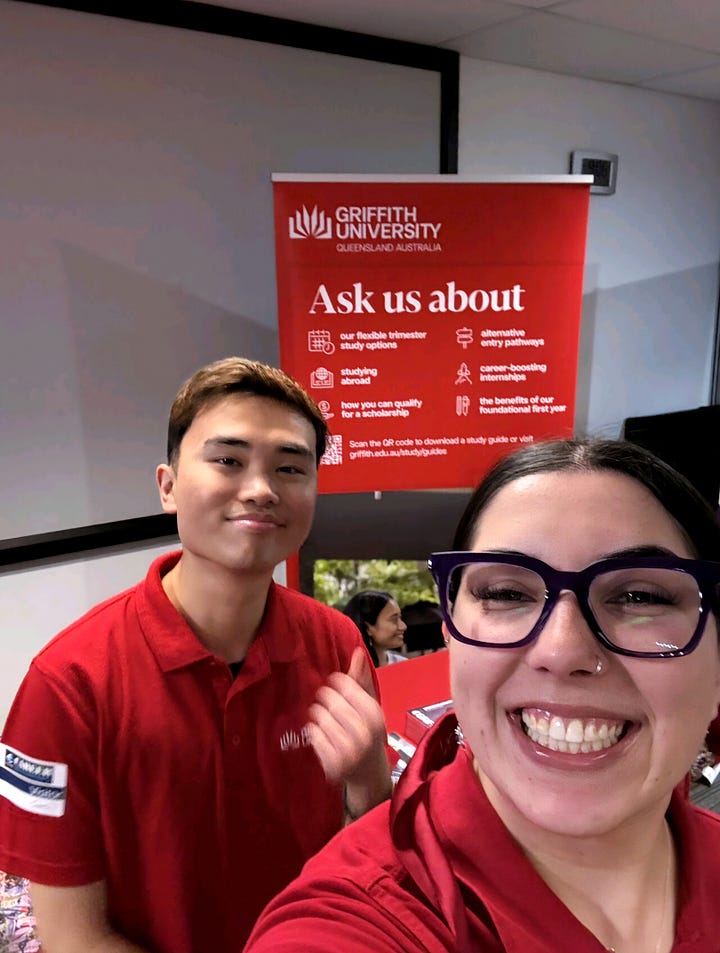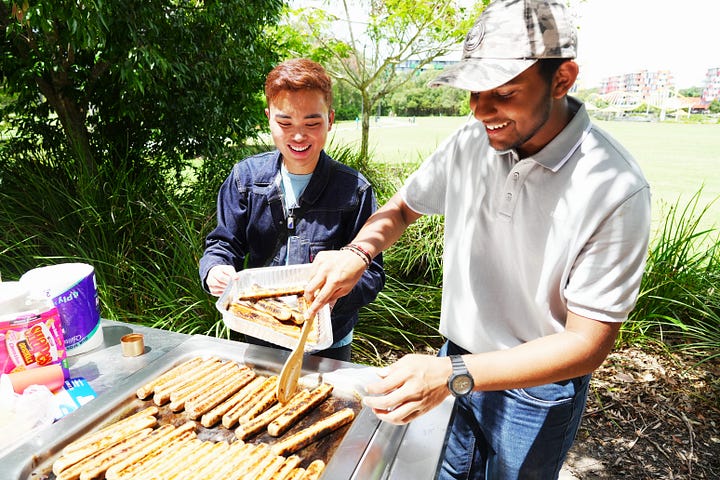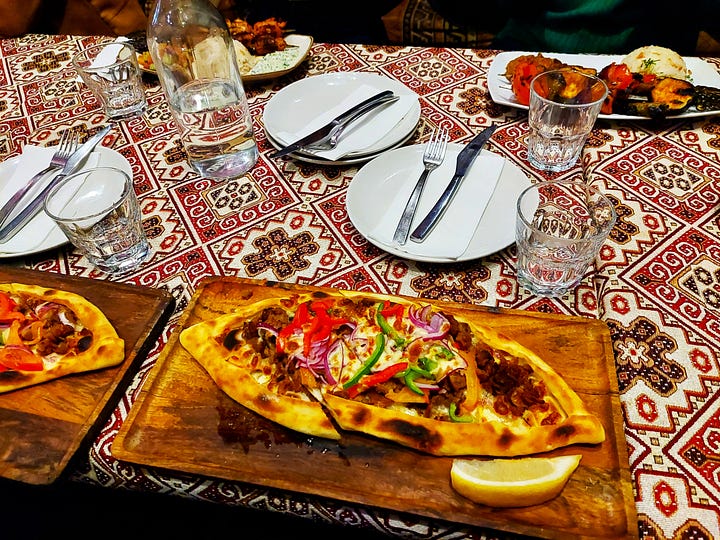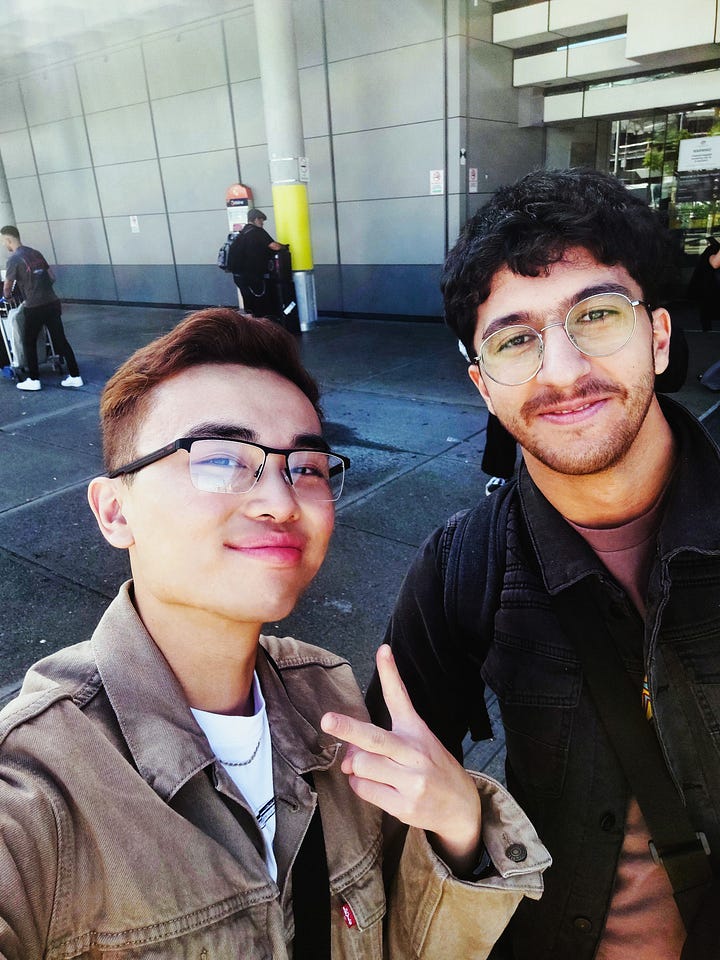The fourth and penultimate trimester of the Bachelor of Medical Science is officially behind me. Only one more trimester stands between me and the finish line of this degree. It's a strange realisation to have reached this point already, but any sentimentality had to take a backseat from the outset of Trimester 4, because this one wasn't going to be gentle.
I entered this trimester with barely a moment to breathe. After just a one-week break following the whirlwind that was Trimester 3, I found myself plunging headfirst into new responsibilities as President of Griffith Medical Science Society (GMED) and a Student Ambassador for the university. That 'break' was anything but restful: I helped coordinate the induction day for the incoming first-year MedSci cohort and organised a cross-campus social BBQ mixer at the Gold Coast to give new students a chance to meet each other (and some of us in the years ahead) before things got underway.
It was at this BBQ that a few of our MD1 friends, having recently graduated from MedSci, let slip that Trimester 4 was colloquially known as the death tri. Their faces were half-amused, half-traumatised, as they described the cluster of five notoriously difficult courses, stacked assessments, and the general consensus that it was the hardest academic stretch in the entire program. Having barely made it out of Trimester 3 without imploding, and now staring down this beast while juggling several new leadership roles, I knew I couldn't afford to slip into the same pitfalls again.
What followed was the most challenging, chaotic, and character-building trimester of my university experience to date.
In this post, I'll break down the five so-called 'death' courses I took head-on this trimester, and reflect on what it was really like living through the infamous Trimester 4.
PROTEIN SCIENCE 🍖
I didn't expect this course to be a standout, but it ended up being one of the most enjoyable and well-integrated subjects of the trimester. Despite a rocky start with clashes in my schedule, the content really grew on me, and it ended up tying beautifully into everything else I was studying, including courses I completed last year.
Learning: The weekly in-person lectorials were unfortunately scheduled at the same time as the live Neuroscience review sessions, which were conceptually more demanding, so I made the strategic choice to attend Neuroscience live and catch up on Protein Science via the recorded sessions. Thankfully, the recordings were solid, especially in covering the lectorial questions that ended up being very helpful revision for the final exam. Workshops ran every fortnight, and I genuinely found them valuable — not only for clarifying the core content but also for helping me make cross-links with other courses like Metabolism, Integrated Systems Physiology, and even older ones like General Microbiology and Biosciences Laboratory. We also had an in-person lab session which I had a head start on thanks to my prior experience with the same experiments in Biosciences Laboratory, e.g. pipetting, Bradford assays, electrophoresis, etc. I already understood the steps, so I could focus more on the why. The last module gave us some freedom of choice — I picked “Protein Therapies” out of the four topics, which was not only the most interesting to me but also felt the most clinically relevant to my future career.
Assessments: The workshop quizzes carried a hefty 35% weight (with no mid-trimester exam this time around, following feedback from last year), but only the best 5 out of 6 counted, which helped with stress management. Interestingly, a lot of those quiz questions came up again in the final exam, as did many of the lectorial questions — so reviewing those carefully paid off a lot. The lab assessment was simple: just turn up and pass all the steps. One of the portfolio assessments involved writing our own MCQs, which was surprisingly enjoyable and helped reinforce the content. And as it turned out, not a waste of effort either…
Final Exam: By far the best final exam of the trimester. No curveballs, no vague questions — just a comprehensive test of everything we'd actually learned. The format was 50% MCQs and 50% short-answer questions (up to 6-mark responses), and I found myself writing so much that I had to watch the clock carefully. The MCQs were refreshingly fair; about 30% were ones we'd written ourselves, which the whole cohort agreed on afterwards. That gave a useful feedback loop too, as I could see how those same MCQs hinted at the kinds of ideas I'd need to unpack in the short-answer section. I walked out of that one feeling like I'd actually been able to show what I knew.
METABOLISM 🌽
Metabolism felt like a return to old-school biochemistry — full of interconnected pathways, enzyme cascades, and more molecular structures than I could comfortably keep in my head at any one time. I knew from the beginning this course would be detail-heavy, so I leaned into it with a highlighter in one hand and a pack of coloured pens in the other.
Learning: I attended the first few lectures in person, but I quickly realised that the pace didn't suit the kind of detailed, colour-coded notes I like to make for subjects like this. So I pivoted and started rewatching the recorded lectures at my own pace alongside the slides, which let me pause and really build out my notes properly. That process actually became the key learning experience for this course. Workshops were okay, but being the final group of the week, our sessions felt more like lectorials. Not much group discussion or interaction, and the energy was a bit flat. Still, the questions we worked through were solid, and I knew they'd come in handy when the final exam rolled around.
Assessments: I had two types of workshop quizzes throughout the trimester: pre-workshop quizzes (worth a small amount and gave full marks if you got 70% or above) and larger integrated workshop quizzes that carried more weight. The pre-workshop quizzes were peer-marked — and unfortunately, mine somehow kept ending up with the same person, who had a very creative sense of marking. Despite some eyebrow-raising deductions, I still ended up with full marks overall. I scored well over 90% in the integrated quizzes too, which made up a good chunk of the grade. We also had two in-person module quizzes in the lecture theatre, worth 25%. The first one was rough — I hadn't memorised all the intermediate structures as thoroughly as I should have, but managed to reverse-engineer a few based on pathway logic (e.g. spotting ATP usage or water loss helped clue me in to which reactions were happening). The second quiz, which focused on beta-oxidation, transamination, and purine degradation with gout and Lesch-Nyhan syndrome, felt much better — I even walked out feeling confident, despite forgetting the structure of ornithine. So close to full marks!
Final Exam: Metabolism was my last final exam of the trimester, and by that point, I just wanted to be done. The MCQs were a breeze — definitely a 90%+ performance there. The short-answer section was a bit more hit-and-miss. Some questions were vague or oddly phrased, but thankfully, there were choices available, and I could lean into the topics I was stronger in. There was a lot of drawing involved (structures, diagrams, stepwise conversions) and I actually enjoyed showing what I'd retained. I left one 2-marker blank (completely forgot the details of mitochondrial shuttles), but otherwise I felt solid. Not quite as clean as Protein Science, but this was easily my second-best final exam overall.
INTEGRATED SYSTEMS PHYSIOLOGY 🚴♂️
This course started out as one of the most enjoyable I've taken in MedSci so far, having loved both A&P courses last year — applied, hands-on, and clinically relevant in the best possible ways. But what began as a genuinely engaging and interactive learning experience somehow nosedived at the final hurdle in what can only be described as an exam-day catastrophe.
Learning: The structure of this course made it one of the most rewarding to engage with during the trimester. Each week involved some light pre-class prep (short online videos and lecture slides), followed by in-person lectorials that were fun. We'd do applied practice questions in groups, and there was always a high-energy whole-cohort MCQ quiz with prizes for the winners, so there was an informal sense of competition that kept things lively. On top of that, we had four physiology labs and four case study tutorials, all of which were genuinely great to participate in. We used proper equipment like stethoscopes, spirometers, Monark bikes with stress testing, even did skinfold anthropometry — all of it helped bring the theory to life. The case studies were especially good when working through them with other MedScis, bouncing off each other's logic and reasoning to come up with a diagnosis or mechanism. It was the kind of collaborative clinical thinking that felt like a preview of MD life.
Assessments: Before the final exam, we had two major assessments, each worth 25%. Both were done in a unique format I hadn't encountered before — scratch-card MCQs, where you'd literally scratch off your answer with a coin, and find out on the spot if you were right. If you scratched the correct answer on the first go, you got 1 mark; second go got you 0.5; third got you 0.25. It was gamified in a way that made it feel less like an exam and more like a quiz night, which I somewhat liked. The first one was tough. Cyclone Alfred meant we missed the first lab, which affected my understanding of setups like the mean electrical axis, and that gap showed. I performed better in the second quiz, which leaned more into formulas and calculations (my strong suit), but because my first result had pulled me down, I was really banking on a strong final exam to lift my overall grade.
Final Exam: And then… disaster. This was, without exaggeration, the worst final exam I've done in MedSci so far. Not because the content was hard, but because the questions were genuinely absurd. The MCQs were fine. But then came the lectorial-based short answers, which were just plain ridiculous. One question referenced a donkey analogy that had been mentioned once, in passing, in a single lecture. Another asked for the specific condition of a case study patient from Week 4, out of more than 30 cases covered. We were expected to recall the precise body surface area or lipid breakdown of some long-forgotten example. It didn't feel like an exam of physiology; it felt like a punishment for not having a photographic memory. It was dumb hard, not conceptually hard. At the time, all I could do was laugh — it was too ridiculous not to. A spectacular, shambolic end to an otherwise brilliant course.
NEUROSCIENCE 🧠
Neuroscience had all the components to be my favourite course this trimester — visually rich content, quirky teaching, and topics that genuinely fascinated me. But as the trimester wore on and the assessment pile grew, it became the subject that kept getting pushed to the back burner… until suddenly, it was front and centre in the very first final exam.
Learning: The course was delivered through pre-recorded lectures narrated by the convenor, who walked us through his detailed, annotated A3 sheets, packed with colour, diagrams, and a very visual flow of logic that really suited my learning style. His storytelling was eccentric. As a Michigan native with a treasure trove of weird and wonderful anecdotes, he'd frequently go off-script, but in an entertaining, endearing way. We also had hands-on practicals, including a lamb brain dissection and some applied stations that brought back fond memories of last year's A&P practicums. The review sessions were especially helpful to consolidate some of the denser content. That said, with the intensity of the other four courses, Neuroscience often took a backseat in my weekly study schedule; I was typically a week behind most of the trimester. But when assessments approached, I always made sure to catch up.
Assessments: Neuroscience didn't hold back on the assessment front. There were a lot of components: a series of fortnightly content quizzes, a statistics assignment using SPSS (thankfully much more intuitive than RStudio), and a practical exam that followed the same station-based format as the A&P ones from last year — 1 minute per station, no time to think, just go. We also had a bizarre experiment on memory involving flashing symbols and oddly linked videos, which we later turned into an essay. And then there was the lamb brain quiz, which felt shoddy, but I did decently overall across all of it. Still, with the final exam worth 50%, I knew I needed to pull something big to secure a 7.
Final Exam: What a brutal way to start the exam block. I went into the exam wanting to set the tone for the rest of the finals, but walked out feeling so deflated. The paper seemed fine during perusal — nothing too terrifying at first glance — but once I got into it, the MCQs were deceptively hard. I spent way too much time deciphering complex scotoma and nystagmus lesion questions and figuring out how to interpret the stats data, which meant I ended up skipping past most of the short-answer section just to buy myself time. By the time I reached the final extended response — a topic I loved (long-term potentiation at the CA3-CA1 synapse and how the Papez circuit consolidates episodic memory) — I had only 12 minutes to go. I knew exactly what I wanted to write and diagram, but my hand couldn't keep up with my brain. I left out so much detail and left the exam gutted. I didn't stick around afterwards, as I couldn’t bear to hear how much more everyone else had written. I thought my hopes of a 7 were gone. But somehow, I pulled an 86/100. Still don't know how. I left at least four questions blank and rushed through a fifth. Maybe everyone else struggled just as much, or maybe my diagrams carried more weight than I thought.
IMMUNOLOGY 🦠
Immunology was a course of contrasts — some great teaching, some frustrating gaps, and assessments that never quite felt like they went to plan.
Learning: This course was a mixed bag from the start. We had two lecturers, and their teaching styles couldn't have been more different. One provided detailed commentary alongside clear diagrams, which made working through the content structured and manageable — I could finish a lecture and feel like I actually understood something. The other, though, leaned heavily on images with almost no textual guidance. It left me second-guessing what to write down and wondering if I was even focusing on the right things. The workshops were split into two types: content and integrated, just like Metabolism. The content workshops were absolutely essential, especially when I came out of certain lectures with more questions than answers. The integrated workshops were more tolerable, with better participation, more thoughtful discussion, and overall stronger group energy compared to Metabolism.
Assessments: The two module quizzes were no joke. Both were tough and felt pretty awful walking out of them, even though I scored 80% for each. Still, with both quizzes being worth 15%, those marks stung more than they should have. The integrated workshop quizzes were all over the place — the first two were a breeze, but the third hit harder than expected, and my mark didn't reflect the effort I put in. The group case study presentation was one of the more enjoyable parts of the course. I was lucky to be paired with a fellow MedSci, a Biomed I'd previously worked with during the business study tour in Vietnam, and two more Biomed students who were both lovely and reliable. We tackled a complex EBV case involving a particularly nasty adolescent case study, and our group pulled it together really well (our video animation was a hit!). I handled the post-presentation questions from both convenors (with the rest of the group and everyone else in the workshop watching), even improvising a point about EBV latency vs. HIV lysogeny that went down surprisingly well.
Final Exam: After the psychological trauma of the Neuroscience final, I was determined not to let that set the tone for the rest of the exam period. Unfortunately, Immunology fell on the same day as Integrated Systems Physiology, which made for a brutal double-header. This one was at 8am (of course), and while the MCQs weren't too bad, some of the short-answer questions had me digging deep into foggy parts of my brain. I did my best, pacing myself as best I could given the early start and mental fatigue. It wasn't a perfect performance, but I scored high enough to secure a 7 for the course.
WIDER EXPERIENCE ⛈️
Trimester 4 didn't exactly start on the smoothest of notes. Cyclone Alfred swept in at the beginning of the trimester and shut everything down for two full weeks, throwing off any hope of a strong, ahead-of-schedule start. Travel was chaotic, groceries were a hassle to find, and much of the campus, including areas around the library, was closed due to flooding. The panic-buying of bottled water was a little over the top (but also somehow inevitable). It was hard to claw back motivation during that disrupted period, especially when I'd set a personal goal of reigniting the work ethic that had faltered back in Trimester 3. Starting late didn't help.
There were, however, some really meaningful wins outside of study. My mother finally arrived back in Melbourne — my close family is now all in the same country again for the first time in what feels like forever. I can't wait to see her during the final trimester, after having not been together in the 18 months since I left London. The most personally transformative moment this trimester, though, happened quietly — outside of uni, outside of study, but massively important. After negative skin-prick tests for dairy, peanuts, and fish back in October (just before heading off on the business study tour to Vietnam), I progressed to full food challenges for all three, and passed each one without a single reaction. For the first time in my life, I reached the maximum challenge doses with no signs of anaphylaxis. It was a surreal, emotional moment, like shedding an invisible weight I'd carried for as long as I can remember. Since then, I've been slowly but joyfully exploring the culinary world I've missed out on for my entire life. The freedom to eat without fear, especially while out, travelling, and trying new things, has opened up so many possibilities. I finally feel like I don't have to constantly tiptoe around food, and I couldn't be more grateful.
That said, while Trimester 3 was a test of mental health, Trimester 4 ended up taking a toll on my physical health. I put my head down so hard to push through all five courses that I often neglected exercise, sleep quality, and anything that resembled a break. Something I definitely want to address moving forward.
Socially, things were far more stable and fulfilling this trimester. The fragmentation of Trimester 3 (a big contributor to my poor mental health back then) gave way to much more positive interactions this time around. Being the GMED President has naturally pushed me into meeting heaps of new people in the first-year MedScis, and I've really enjoyed being that point of contact and support for them. Sadly, due to Cyclone Alfred's disruptions, many major university-wide social events were cancelled or pushed into next trimester, so I didn't get the chance to go on as many day trips or hang out with friends outside MedSci as I'd hoped.
Two of the students I mentored into MedSci last year have now fully settled into the five-course workload and are absolutely thriving — high-performing, motivated, and just great people to have in the community. I even helped one of them move into their new place, waiting at Brisbane Airport and carrying items from utensils to a mini-fridge (which, of course, had to be lugged up multiple flights of stairs). Small things, but moments I won't forget.
Looking ahead, I want Trimester 5 to be my best one yet. As intense as this trimester was, I genuinely loved the content of every course; the synoptic connections between them made the learning feel cohesive and intellectually satisfying. I had a hunch when I saw the course titles that this would be my favourite trimester content-wise, and I was right. With only four more courses in Trimester 5 (the lightest study load I've had in MedSci), I'm excited for a bit more breathing room. I'm planning to pick up more Student Ambassador shifts, focus more on my physical health, and make up for the lack of social outings this trimester. Planning is also underway with the GMED team (plus the Gold Coast and Sunshine Coast MedScis) for the Health Ball at the end of Trimester 5 — a fitting celebration of the absolute rollercoaster these last two years have been.




OVERALL
Trimester 4 was always going to be a big one. Five of the hardest courses in the entire degree, stacked together under the infamous banner of the 'death tri', with barely a week to breathe after Trimester 3. Add in Cyclone Alfred, a two-week lockdown, and a full plate of responsibilities as GMED President and Student Ambassador, and it's no wonder I spent the early weeks trying to catch up rather than get ahead. But despite the chaos, this trimester weirdly felt more stable and meaningful than the one before. I was mentally in a better place, socially more connected, and really liked the content I was learning — not something you expect to say while juggling Immunology, Neuroscience and Integrated Systems Physiology all at once. It wasn't perfect, and I know I pushed my physical health way down the priority list, but there's a certain resilience I've built this trimester.
As I step into the final trimester of the Bachelor of Medical Science, I'm feeling hopeful — and maybe even a little nostalgic already. With only four courses left and a clearer sense of what I need (and don't need) to do to stay healthy and happy, I want to make this last leg count. There's a lot to look forward to: finally seeing my mother again, organising and taking part in more social events, putting energy back into my physical wellbeing, and creating a memorable Health Ball for the entire MedSci cohort. If Trimester 4 taught me anything, it's that growth often comes in the middle of the storm. And thankfully, that storm has passed.
For the next few posts on OZBRIT Medic, I'll be sharing medical school interview tips and guidance for aspiring medics!




